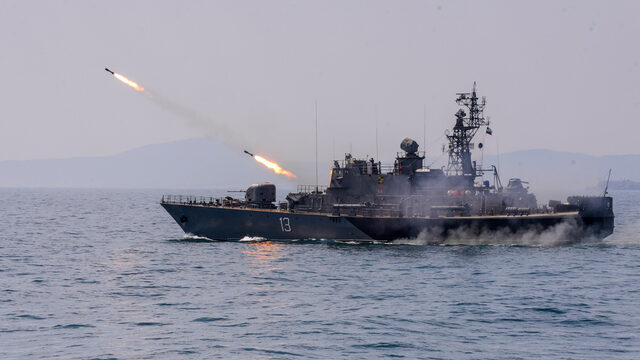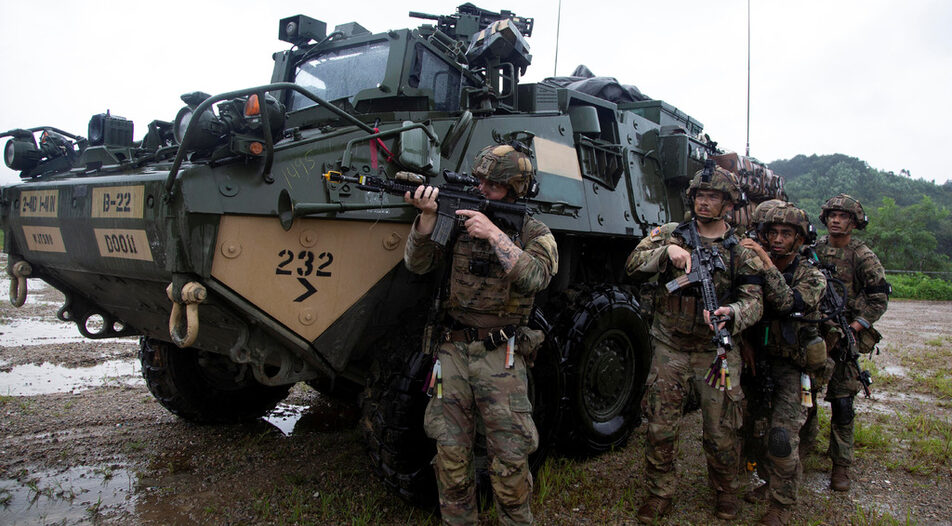After years of neglect, the Bulgarian Defense Ministry under Todor Tagarev appears to be scrambling to push through several key military rearmament projects that have been deferred for years, if not decades.
First, about ten days ago the US State Department announced the approval of a possible export of 183 Stryker armored fighting vehicles (AFVs) to Bulgaria for a maximum price of up to USD 1.5 billion. This was quickly followed by news of an American delegation arriving in Bulgaria as early as last week to conduct negotiations for a quick conclusion of an interstate agreement on the issue.
Then, last Wednesday Prime Minister Nikolay Denkov suddenly announced during a Q&A that his cabinet has launched an urgent search for anti-ship missiles to arm its coastal guard. "At the moment we do not see a direct threat to Bulgarian ports, but one has to respond to the use of force with force. That is why we have started buying missiles for the coast guard so that no one dares approach our Black Sea cities," he said.
While the activation of the cabinet on these projects is commendable, it is likely that both will be carried out via state-to-state direct negotiations, circumventing ordinary procurement procedures. In other words, competitive bidding that might have saved the state some funds will be sacrificed for the sake of rapidly acquiring the much-needed defense systems.
Armor for the infantry
First, let's take a look at the AFVs deal. The US experts' visit ought to have taken place late last week, but there is still little clarity on the final parameters of the possible deal. It is very likely that the price for the Stryker battalion will be lower, as the funds allocated in the form of military aid under the Foreign Military Financing (FMF) programme, and also most likely the value of the 100 gendarmerie APCs that Bulgaria is preparing to give to Ukraine will be discounted.
This is important, as the announced price of USD 1.5 billion, or about BGN 2.7 billion at the current dollar exchange rate, is drastically at odds with the BGN 1.5 billion budget that the Bulgarian parliament voted for the acquisition of 150 armored fighting vehicles for ground troops.
Of course, this happened several years ago (the project has been restarted twice already), before the war and inflation drove defense products' price up. It should also be noted that the current offer from the US side includes not 150 but 183 units of combat equipment, which is, roughly speaking, 20% more machines. Furthermore, it is all the equipment needed to provide a full heavy mechanized brigade, including 90 Stryker Dragoon heavy armored vehicles, additional modular armor (including mine countermeasures), tracked evacuation vehicles, and 33 advanced command and control vehicles that will provide real-time communications and combat control at the brigade level. In this way, Sofia could finally fulfill its commitment to provide a fully interoperable brigade for the needs of the NATO's Allied Response Force (NRF), and not simply buy "piecemeal" small quantities of combat vehicles, from which it will then spend a long time trying to assemble a combat-capable unit.
According to unofficial information that Capital weekly gathered, the final price that Bulgaria will seek will be about USD 1.1 billion, or just under BGN 2 billion. If such a price is actually met, it will be a serious achievement for Minister Tagarev and his team, especially if the 183 machines are brand new. Also, according to unconfirmed information, the US side has promised delivery of all Strykers within 24 months, which would be unprecedented against the backdrop of the avalanching demand and shortage of weapons' platforms since the start of the Russian invasion of Ukraine.

And rockets for the coastal guard
As for the second project, according to several independent Capital weekly sources, the Bulgarian Defense Ministry had urgently pushed forward the project for the acquisition of new Western anti-ship missile batteries about two weeks ago. The key reason for this move was the escalation of tensions in the Black Sea by the Russian Black Sea fleet after the termination of the so-called grain deal and the establishment of an unofficial blockade in Bulgaria's exclusive economic zone over the past one month. According to the same sources, Sofia has also requested the deployment of allied anti-ship missile complexes to its shores.
Initial talks on the issue have been held by the Chief of Defence Admiral Emil Eftimov and navy experts, who met representatives of the Swedish military concern Saab and the German Diehl Defense, which are at the heart of the consortium that produces the RBS-15 anti-ship missiles.
The type of ammunition in question, and more precisely its penultimate modification RBS-15 MK 3, was selected in a silent and non-transparent way for the needs of the two new modular patrol ships for the navy, which are currently being built by the Varna shipyard Delfin as a subcontractor of the winning bidder German defense company Lürssen (now NVL Group).
There are concerns, however, that the military may now try to avoid a competitive procedure in the case of the coastal missile complexes as well, by purchasing several launchers with a limited number of warheads in a deal worth less than BGN 50-100 million, which would require the Defense Minister's sanction or the Council of Ministers only. However, this could prejudge the type of munitions that will most likely have to be bought for decades to come - in the same way as happened with those for the patrol corvettes.
In any case, even if the choice of these missiles was not made in the cleanest way, Bulgaria's current security urgently requires modern rockets to deter Russian aggression in the Black Sea rather than having to depend on the troops of allied countries. The same argument applies to the long-postponed (and often restarted) AFV project.
After years of neglect, the Bulgarian Defense Ministry under Todor Tagarev appears to be scrambling to push through several key military rearmament projects that have been deferred for years, if not decades.
First, about ten days ago the US State Department announced the approval of a possible export of 183 Stryker armored fighting vehicles (AFVs) to Bulgaria for a maximum price of up to USD 1.5 billion. This was quickly followed by news of an American delegation arriving in Bulgaria as early as last week to conduct negotiations for a quick conclusion of an interstate agreement on the issue.












